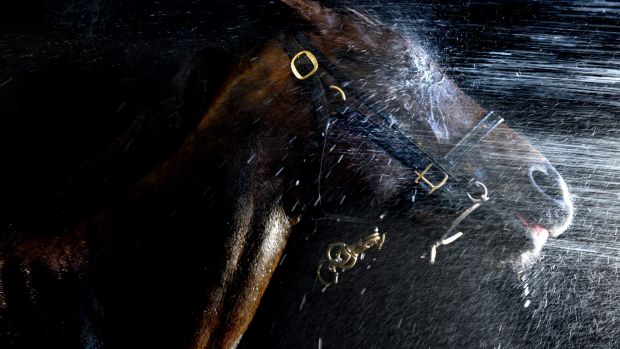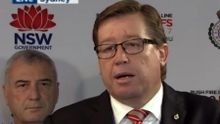An extraordinary heatwave scorching much of NSW is set to bring yet more grief, with health authorities issuing an air pollution alert for increased levels of ozone in the atmosphere in Sydney, which is likely to affect residents with respiratory problems.
Sydney's air quality is forecast to be poor on Saturday, as the mercury climbs to a forecast top of 39 degrees in the city and a sweltering 46 degrees in Penrith and Richmond. Penrith is a chance of notching up its hottest ever day, a record which presently stands at 46.5 degrees.
More NSW News Videos
NSW heatwave: hottest February day on record predicted
An extraordinary heatwave scorching much of NSW is set to bring yet more grief, with health authorities issuing an air pollution alert for increased levels of ozone in the atmosphere in Sydney. Vision courtesy ABC News 24.
The abnormal heat could push the mercury to the state's hottest overall temperature on record for February on Saturday, reaching about eight degrees above normal.
In the state's west, the small township of Ivanhoe, population 200, is tipped to reach a stifling maximum of 48 degrees on Saturday. If the mercury does hit that peak, it would match the small town's hottest ever temperature recorded, set in February 2004, Bureau of Meteorology figures show.
On Saturday, Menindee, Bourke and Wilcannia are each forecast to hit a top of 47 degrees. It comes a day after Hay Airport reached 47.4 degrees, making it the third-hottest temperature recorded in February for NSW - a high mark that might be bettered as soon as Saturday.
Ozone warning
Dr Ben Scalley, from NSW Health, urged people with respiratory conditions in Sydney to take precautions on Saturday due to high ozone pollution, caused by car exhaust and industrial fumes. Ozone pollution is particularly bad on hot, still days, he said.
"Parents are advised to limit outside play for children with asthma," Dr Scalley said.
"Ozone levels reach their peak around 7pm ... and tend to be lowest in the morning, so it's best to plan outdoor play in the morning when the day is cooler."

He urged asthma sufferers to follow their asthma action plans and take their relieving medication where necessary. If symptoms get worse, those affected should seek medical advice.
Threat of blackouts

The threat of power shortages looms again on Saturday, with the Australian Energy Market Operator (AEMO) issuing an alert for a potential lack of power reserve in NSW for two periods: 2.30pm to 4pm, and 7pm to 8.30pm. At those times, power reserves are likely to be below the minimum buffer.
On Friday, NSW avoided load shedding of households in part by asking Tomago Aluminium, the country's biggest aluminium smelter, to reduce power output by about 300 megawatts. That was roughly the shortage that prompted blackouts to about 90,000 households on Wednesday evening in South Australia.
During Friday evening, wholesale prices in NSW peaked at their maximum level of $14,000 per megawatt-hour. Matt Howell, the chief executive of Tomago Aluminium, likened the price jump to turning up "at your local BP service station and paying $460 per litre of petrol".
AGL Energy says it expects one of two units being repaired at its Liddell Power Station in NSW to be back online late on Saturday, as soaring temperatures place pressure on the state's energy supply.
AGL says boiler leaks at the second unit won't be repaired until late next week.
State Energy Minister Don Harwin said it was common for coal-fired power stations to have transient faults.
On the weather front, NSW could average eight degrees above average - recording about 43 degrees - at the peak of the heat.
The current record for February is 41.99 degrees. Reaching the all-time high would be a bit tougher - that figure stands at 44.06 degrees, set on January 14, 1939.
"For NSW, the area coverage of the heat is extremely rare, comparable with events such as the 1939 heatwave that were associated with the Black Friday bushfires in Victoria," Karl Braganza, head of climate monitoring at the Bureau of Meteorology, said, adding that the current record February day for the state was set in 2004.
Catastrophic fire conditions forecast
Total fire bans are also in place across NSW on Saturday, with fire danger reaching "severe" levels in the Hunter and four other inland regions of the state. For Sydney, the threat is deemed "very high".
Rob Rogers, the Rural Fire Service (RFS) Deputy Commissioner, said "catastrophic" fire ratings were likely for parts of NSW, including the Hunter, on Sunday. Such a threat level has been issued only once before in NSW - in 2013 - since national standardised ratings were introduced in 2009.
On Saturday, he offered a blunt message to those considering visiting fire-prone areas: don't go.
"Go to the beach instead, do something else, particularly those people who may be thinking about camping. Plan it for another time," he said.
He said firefighters were expecting a particularly tough five-hour period on Sunday, before a southerly change swept through on Sunday evening and into Monday morning.
Saturday's top of 39 degrees, would make it Sydney's 11th day above 35 degrees this summer if achieved, extending the record broken on Friday.
Sporting events cancelled
Cricket NSW was among sporting groups to cancel all grades of the sport on Saturday, and junior and senior associations followed suit. Many schools had already alerted parents they could enjoy a lie-in on Saturday rather than encourage their tyros on the sports fields of the state.
"My main concern is that grade cricket does not have the infrastructure in place to safely monitor and manage heatstroke in what is essentially an amateur volunteer-run organisation," John Orchard, Cricket NSW's doctor, said.
The NSW Rugby League abandoned the start of its junior league competition and cancelled women's fixtures.
Racing NSW stewards have moved Randwick's Apollo Stakes meeting from Saturday to Monday because the heatwave conditions.
After representation from leading stables, stewards decided it was better to move the meeting rather than risk horse and rider safety in the heat on Saturday.
The Tropfest short film festival is being held in Parramatta Park on Saturday night, after moving from from its previous location of Centennial Park. Organisers have moved the event's junior festival, Trop Jr, from Parramatta Park to Event Cinemas at Westfield Parramatta to ensure the health and safety of those attending.
With AAP














